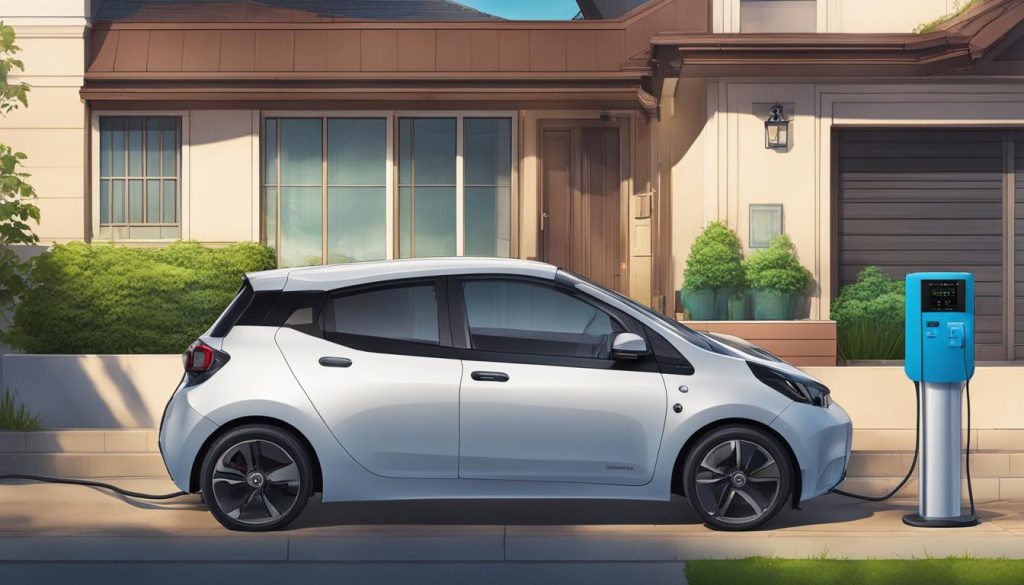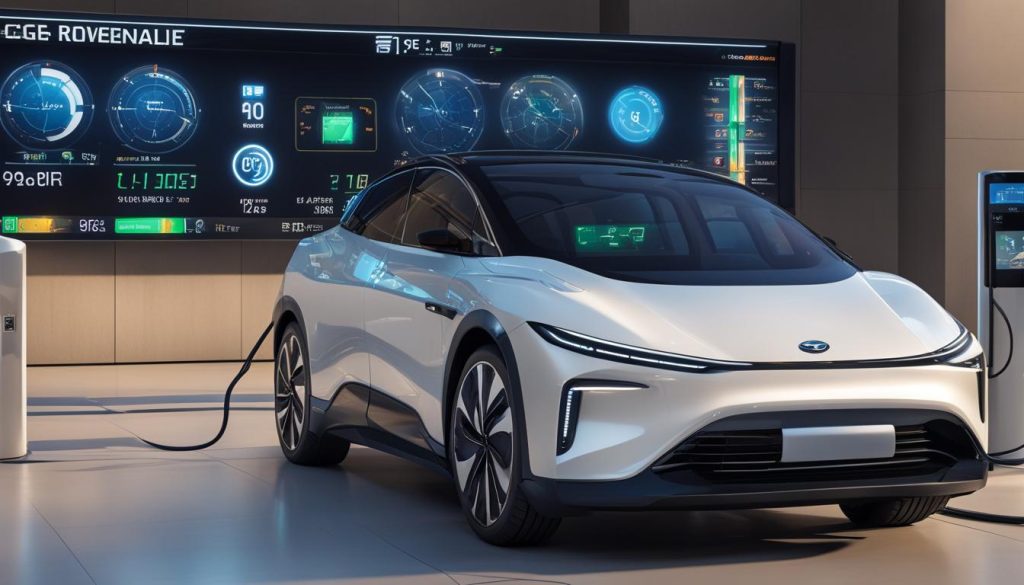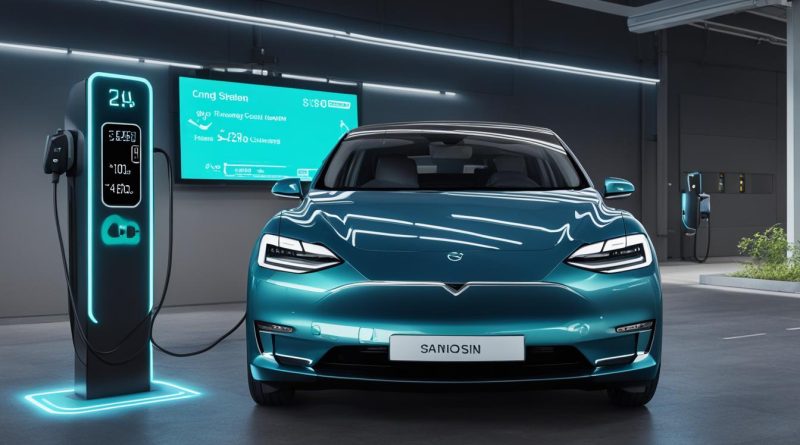Electric Car Charging Costs Explained
Electric cars are becoming increasingly popular, thanks to their eco-friendly credentials and efficient performance. However, one major consideration for those contemplating the switch to electric vehicles is the cost of charging them. In this section, we will explore the costs associated with charging an electric car and equip you with all the essential information you need to know to make informed decisions about managing your electric car charging costs.
As you may know, the cost of charging an electric car can vary depending on the charging method, location, and duration. In the following sections, we will provide you with an in-depth analysis of charging costs at home stations and public charging points.
Key Takeaways
- The cost of charging an electric car is influenced by various factors.
- Understanding home and public charging costs is essential for minimizing expenses.
- Comparing costs and efficiency of different charging options can help you make well-informed decisions.
- Charging an electric car at home is cheaper than using public charging points.
- Managing charging expenses can ultimately save you money in the long run.
Understanding Home Charging Costs
Charging an electric car cost can vary depending on where and how you do it. In this section, we will discuss the average cost to charge an electric vehicle at home.
| Location | Average Cost Per Kilowatt-hour |
|---|---|
| Home Charging | £0.14 – £0.19 |
| Public Charging | £0.24 – £0.36 |
As per the table, the average cost to charge an electric vehicle at home can range between £0.14 – £0.19 per kilowatt-hour, with the actual price depending on your energy supplier and tariff. To calculate the total expenses for charging your vehicle at home, you need to consider the battery capacity, how much charging is done and the cost of electricity.
You can calculate the average cost to charge your vehicle at home by dividing the battery capacity of your vehicle in kilowatt-hours (kWh) by the total cost per kilowatt-hours charged. For example, a Nissan Leaf has a battery capacity of 40 kWh, and if the cost per kilowatt-hour is £0.15, then the average cost to charge your vehicle at home would be £6.
Installing a home charging station can significantly reduce the average cost of charging an electric vehicle. It allows you to take advantage of cheaper off-peak energy tariffs, further reducing the overall cost of home charging.
By understanding the average cost to charge an electric vehicle at home, you can make informed decisions regarding managing your electric car charging costs.

Exploring Public Charging Point Expenses
When considering the costs associated with charging an electric vehicle, it’s essential to take into account the expenses incurred at public charging stations. The prices for using public charging points can vary depending on the location, network, and time of day.
Some public charging networks have fixed rates per kilowatt-hour, while others have more complex pricing structures. These may include connection fees, time-based charges, and session fees, all of which can affect the final cost of charging your electric car.
Additionally, the cost of using particular charging networks can be influenced by membership fees or subscription packages, which may offer discounts to frequent users. It’s worth researching the available charging networks within your area to determine the most cost-effective option for your electric vehicle charging needs.
Aside from pricing structures, other factors can impact the cost of using public charging stations. These include the charging speed and the type of charging connector required for your vehicle. Some charging providers may also charge different rates for peak and off-peak times, reflecting fluctuations in energy demand.
Understanding these factors is essential in accurately budgeting for your electric car charging costs. By researching public charging points and the different pricing structures offered by various networks, you can make informed decisions about the most cost-effective way to power your electric vehicle.
Public Charging Point Cost Comparison Table
| Charging Network | Rate per kW | Connection Fee | Session Fee | Membership Fees |
|---|---|---|---|---|
| Polar | 30p | £1 | £0 | Starting at £7.85/month |
| ChargePoint | 28p | £0 | £1.20/session | Starting at £4/month |
| BP Pulse | 27p | £0 | £0 | Starting at £7.85/month |
| Shell Recharge | 39p | £0 | £0 | £0 |
“Researching the most cost-effective public charging networks and pricing structures is crucial in keeping electric vehicle charging expenses manageable.”
Comparing Costs and Efficiency
In this section, we will provide a comparative analysis of the different charging options available for electric cars. By understanding the relative costs and efficiency of each option, you can make well-informed decisions regarding your electric car charging strategy.
Cost per Mile of Different Charging Methods
One of the main factors to consider when comparing charging options for electric cars is the cost per mile of each method. This includes both the cost of the electricity and any additional fees that may be associated with different charging stations. For example, some public charging stations may charge a higher rate during peak hours, while others may have a flat fee for each charging session.
To give you a clearer idea of the cost per mile of different charging methods, we have put together the following table:
| Charging Method | Average Cost per kWh | Additional Fees | Cost per Mile |
|---|---|---|---|
| Home Charging | 14p | N/A | 4.2p |
| Public Charging (Rapid) | 30p | £5 flat fee | 14.4p |
| Public Charging (Fast) | 25p | £1 per hour | 8p |
As you can see from the table, home charging is typically the most cost-effective option, with an average cost per mile of 4.2p. However, it may not be the most convenient option if you are away from home for extended periods of time. Public charging stations vary in their cost per mile, with rapid charging stations being the most expensive option.
Efficiency and Financial Implications of Each Option
Another important factor to consider when comparing charging options is the efficiency and financial implications of each option. For example, rapid charging stations may cost more per mile, but they offer the fastest charging speeds, allowing you to quickly top up your battery during a long journey.
On the other hand, slower charging options may have lower costs per mile, but they may take longer to charge your vehicle, which could impact your journey times and travel plans.
When considering the financial implications of each option, it’s also important to take into account any additional costs, such as the price of installing a home charging station or membership fees for public charging networks.

By carefully evaluating the costs and efficiency of each charging option, you can make informed decisions about how to manage your electric car charging expenses. Whether you choose to primarily charge your vehicle at home or take advantage of public charging stations, understanding the relative costs of each method will help you to reduce your overall electric car charging cost.
Conclusion
Understanding the costs associated with charging an electric car is essential for managing expenses effectively. This article has provided an in-depth analysis of the various expenses involved in charging an electric vehicle, including home station and public charging point costs.
By evaluating the average cost per kilowatt-hour for home charging and exploring the pricing structures of various charging networks, individuals can make informed decisions about budgeting their charging expenses. Comparing the costs and efficiency of different charging methods is also crucial in determining the most economical choices.
Ultimately, by considering all aspects of electric car charging costs and efficiency, individuals can make well-informed decisions about managing their expenses and enjoying a more sustainable, environmentally friendly driving experience.
FAQ
How much does it cost to charge an electric car?
The cost of charging an electric car can vary depending on several factors, including the size of the car’s battery, the electricity tariff, and the charging method used. On average, it may cost around £10-£15 to charge an electric car from empty to full at home.
What is the cost of charging an electric vehicle?
The cost of charging an electric vehicle depends on the electricity tariff and the charging method used. Charging at home can be more cost-effective as you can take advantage of lower electricity rates during off-peak hours. Charging at public charging stations may involve additional fees or subscription costs.
How much do electric car charging stations cost?
The cost of electric car charging stations can vary depending on the brand, features, and installation requirements. On average, a basic Level 2 home charging station can cost between £300 to £600, while commercial charging stations can range from several hundred to several thousand pounds.
What are the charging costs for electric vehicles?
Charging costs for electric vehicles depend on the electricity tariff and the charging method used. It is important to consider the cost per kilowatt-hour (kWh) and calculate the total charging expenses based on your vehicle’s battery capacity. This information can help you estimate the financial implications of charging an electric vehicle.
How do I calculate the average cost to charge my electric vehicle?
To calculate the average cost to charge your electric vehicle, you will need to know the electricity tariff per kilowatt-hour (kWh) and your vehicle’s battery capacity in kilowatt-hours (kWh). Multiply the kWh rate by the battery capacity to get an estimate of the cost to fully charge your electric vehicle.
What is the average cost to charge an electric vehicle at home?
The average cost to charge an electric vehicle at home can vary depending on the electricity tariff, but it is generally cheaper compared to public charging options. On average, it may cost around £10-£15 to fully charge an electric vehicle at home.
How do public charging point prices vary?
Public charging point prices can vary depending on the charging network and the type of charging station. Some charging networks offer subscription plans or offer discounted rates for members, while others charge based on the time or energy consumed. It is advisable to check the pricing structure of specific charging networks to understand the costs involved.




